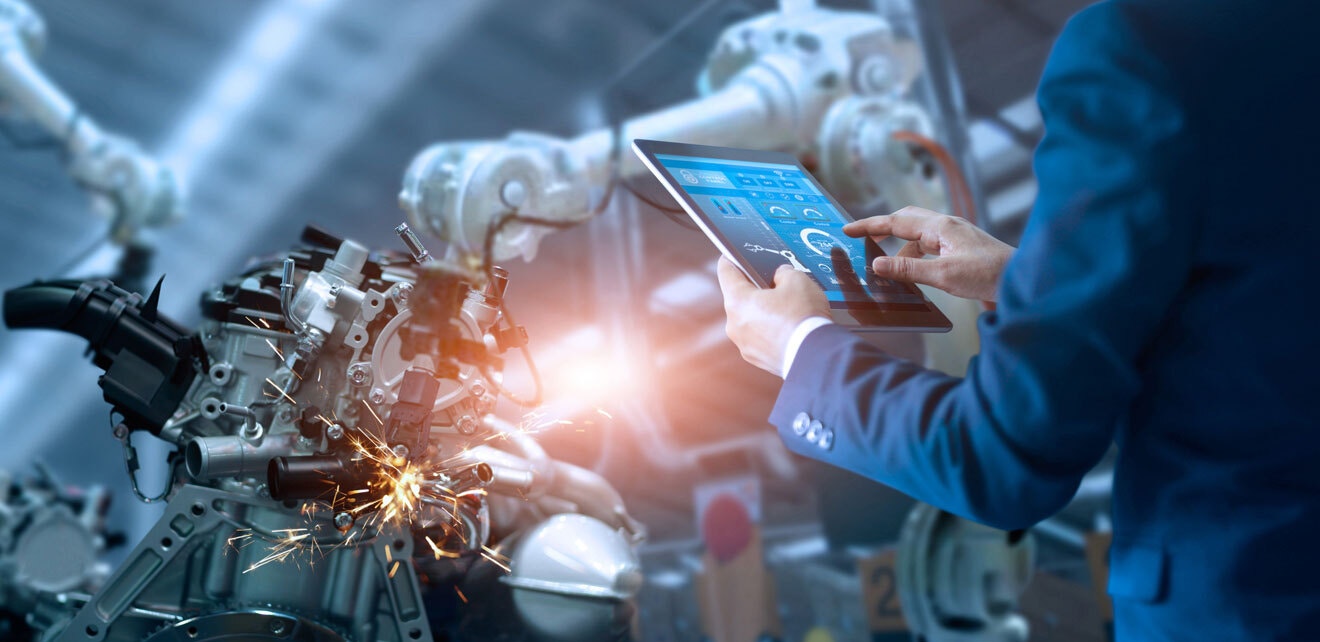Home > Blog
Read Time — 5 minutes
Servitization: the future of the machine builder as a service provider

ECI and IXON Cloud organised a roundtable session, which was broadcast at the end of 2023. The session focused on the evolution of traditional machine building to servitization – where firms don’t only sell products but deliver exceptional service and value to their customers. Experts from IXON cloud, Stefan Van Dooren and Pieter van Lith, and from ECI, Laurens Verbree and Bart Mous, share their perspectives and experiences on servitization, and discuss why it will play a crucial role in the industry's transformation.
Value-added services such as customer support, spare parts, upgrades, maintenance, repair and new innovations can set manufacturers apart from their competitors and promote lasting relationships with customers.
Technology like the internet of things (IoT) is essential to servitization since data from sensors can predict when products will need to be replaced or repaired. It allows manufacturers to tailor services to meet their customers’ needs and monitor their products remotely to prevent downtime.
In short, servitization enables manufacturers to respond to a rapidly changing market in both production and logistics, where customer-centricity is becoming increasingly important.
What is servitization?
Servitization has become a buzzword in recent years partly because of shifts in the consumer market. For example, streaming services sell monthly subscriptions where customers pay to view, instead of purchasing physical copies of TV shows and movies.
Partnerships manager Pieter van Lith, at Ixon Cloud, believes that servitization in the machine-building industry is more than just delivering quality machines. Instead, it focuses on fulfilling the customer’s needs to increase production, quality and speed. It’s not just about the initial sale, but continuously adding value throughout the machine's lifespan.
This aligns with the trend that Stefan van Dooren, Team Lead Solution Engineering, at Ixon Cloud has observed where customers who purchase machines expect more from their suppliers. Bart Mous, sales consultant at ECI, also recognises that by offering servitization, machine builders can monitor their own machines remotely and extend their services.
What is the potential of servitization?
Traditionally, the business model followed by machine builders is the sale of the machine. However, the profit margins on these sales are often stable and estimated at eight per cent for standardised machines.
When talking about engineer-to-order (ETO) machines, this is even lower – sometimes below the cost price, which Laurens Verbree, head of sales at ECI, points out.
He explained that production of a custom machine takes significantly longer, requires a larger investment and there is greater risk of error when compared to a standardised variant. The eight per cent profit margin is only achieved after the sale of a few machines.
Whether referring to standardised or ETO machines, relying solely on sales as a business model can pose long-term profitability challenges. This is what makes servitization so attractive to machine builders and those in the service sector who can increase their margins up to 30 per cent.
Bart also acknowledges that the sale of a machine is increasingly combined with a service contract. ETO machine builders might find the service easier to sell because of their specialist knowledge and their existing relationship with end customers. Servitization can also provide a reliable monthly guaranteed income for project-based machine builders, which can help to improve cash flow.
When is servitization beneficial?
Machine builders often decide to offer a service when ad hoc requests disrupt customers’ production, especially as machinery becomes more complex. Firms might reach a tipping point where they either have to establish their own maintenance team or outsource it. The easiest solution is to outsource it to the machine builder because they understand the design and build better than anyone.
The steps to success
Machine builders can take steps to gradually integrate servitization into their offering. The service should be seen as a separate value proposition and strategically, as opposed to just an add-on. The success for organisations lies in how they deploy the technology to meet customers’ needs and genuinely offer value.
The organisation's structure is fundamental. Service and sales departments tend to operate separately, but without collaboration, servitization strategies can fail to deliver. Input from the end customer about their requirements is also necessary to ensure that the service offered closely aligns with their needs.
Remote monitoring of machines using IoT is also a crucial component that enhances success. Machine builders can move away from reacting to an issue once it’s been reported, and instead take control by reading the machines remotely and knowing when on-site service is needed so they can take action and initiate a proactive service – improving their customer experience and efficiency.
Machine connectivity is only possible with data security certifications, especially when rolling out predictive maintenance which is where manufacturers predict additional repairs or services using data. They can deliver spare parts to customers using the data, and ensure they have the knowledge to replace the part themselves.
What is the reality?
Until now servitization hasn’t been a high priority for the average machine builder because the sector has achieved good results in recent years. However, in the medium term, it’s critical that the value proposition of machine building companies is brought up to speed and future-proofed.
Growing competition requires differentiation to survive. The expansion of the service sector can provide a solution, turning the machine builder into a service provider.
To find out more about the transition to a relational model and how it can benefit your company contact us at uk-bdr@ecisolutions.com



